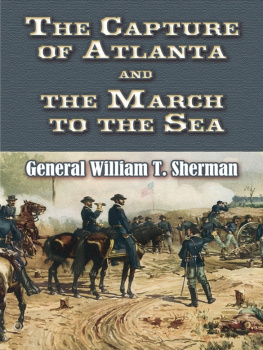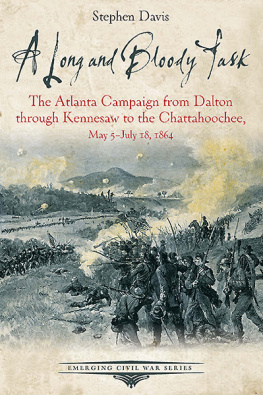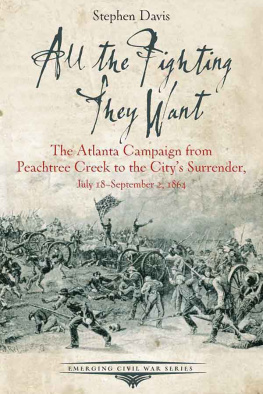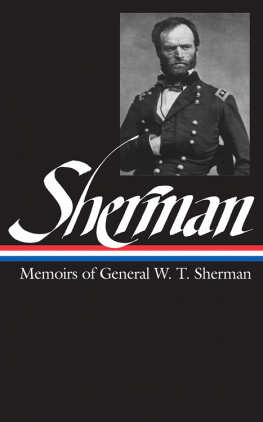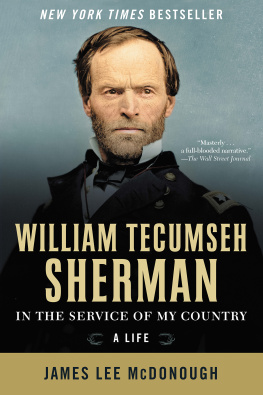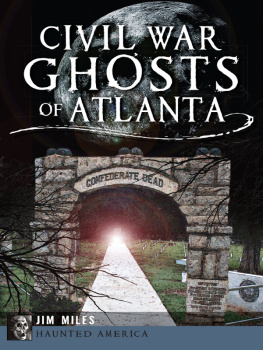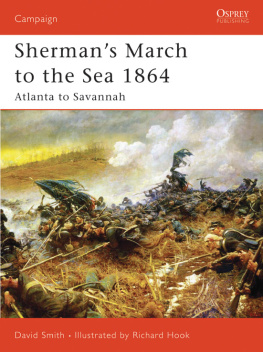
Copyright
Copyright 2007 by Dover Publications, Inc. All rights reserved.
Bibliographical Note
This Dover edition, first published in 2007, is an unabridged republication of Chapters 15 through 20 of Volume II of the Memoirs of General William T. Sherman, originally published by D. Appleton and Company, New York, 1876.
Library of Congress Cataloging-in-Publication Data
Sherman, William T. (William Tecumseh), 18201891.
[Memoirs of General William T. Sherman. volume 2 Chapter 15-20]
The capture of Atlanta and the March to the Sea : from Shermans memoirs / General William T. Sherman.
p. cm.
This Dover edition, first published in 2007, is an unabridged republication of chapters 15 through 20 of volume II of the Memoirs of General William T. Sherman, originally published by D. Appleton and Company, New York, 1876T.p. verso.
9780486147116
1. Atlanta Campaign, 1864Personal narratives. 2. Shermans March to the SeaPersonal narratives. 3. Sherman, William T. (William Tecumseh), 18201891. 4. United StatesHistoryCivil War, 18611865Personal narratives. 5. GeneralsUnited StatesBiography. I. Title.
E476.7.S45 2007
973.7731092dc22
2006053151
Manufactured in the United States of America
Dover Publications, Inc., 31 East 2nd Street, Mineola, N.Y. 11501
GENERAL W. T. SHERMAN TO HIS COMRADES IN ARMS,
VOLUNTEERS AND REGULARS.
NEARLY ten years have passed since the close of the civil war in America, and yet no satisfactory history thereof is accessible to the public; nor should any be attempted until the Government has published, and placed within the reach of students, the abundant materials that are buried in the War Department at Washington. These are in process of compilation; but, at the rate of progress for the past ten years, it is probable that a new century will come before they are published and circulated, with full indexes to enable the historian to make a judicious selection of materials.
What is now offered is not designed as a history of the war, or even as a complete account of all the incidents in which the writer bore a part, but merely his recollection of events, corrected by a reference to his own memoranda, which may assist the future historian when he comes to describe the whole, and account for the motives and reasons which influenced some of the actors in the grand drama of war.
I trust a perusal of these pages will prove interesting to the survivors, who have manifested so often their intense love of the cause which moved a nation to vindicate its own authority; and, equally so, to the rising generation, who therefrom may learn that a country and government such as ours are worth fighting for, and dying for, if need be.
If successful in this, I shall feel amply repaid for departing from the usage of military men, who seldom attempt to publish their own deeds, but rest content with simply contributing by their acts to the honor and glory of their country.
WILLIAM T. SHERMAN,
General.
ST. LOUIS, MISSOURI, January 21, 1875.
MEMOIRS
OF
GENERAL WILLIAM T. SHERMAN.
CHAPTER XV.
ATLANTA CAMPAIGNNASHVILLE AND CHATTANOOGA TO KENESAW.
MARCH, APRIL, AND MAY, 1864.
ON the 18th day of March, 1864, at Nashville, Tennessee, I relieved Lieutenant-General Grant in command of the Military Division of the Mississippi, embracing the Departments of the Ohio, Cumberland, Tennessee, and Arkansas, commanded respectively by Major-Generals Schofield, Thomas, McPherson, and Steele. General Grant was in the act of starting East to assume command of all the armies of the United States, but more particularly to give direction in person to the Armies of the Potomac and James, operating against Richmond; and I accompanied him as far as Cincinnati on his way, to avail myself of the opportunity to discuss privately many little details incident to the contemplated changes, and of preparation for the great events then impending. Among these was the intended assignment to duty of many officers of note and influence, who had, by the force of events, drifted into inactivity and discontent. Among these stood prominent Generals McClellan, Burnside, and Fremont, in the East; and Generals Buell, McCook, Negley, and Crittenden, at the West. My understanding was that General Grant thought it wise and prudent to give all these officers appropriate commands, that would enable them to regain the influence they had lost; and, as a general reorganization of all the armies was then necessary, he directed me to keep in mind especially the claims of Generals Buell, McCook, and Crittenden, and endeavor to give them commands that would be as near their rank and dates of commission as possible; but I was to do nothing until I heard further from him on the subject, as he explained that he would have to consult the Secretary of War before making final orders. General Buell and his officers had been subjected to a long ordeal by a court of inquiry, touching their conduct of the campaign in Tennessee and Kentucky, that resulted in the battle of Perryville, or Chaplins Hills, October 8, 1862, and they had been substantially acquitted; and, as it was manifest that we were to have some hard fighting, we were anxious to bring into harmony every man and every officer of skill in the profession of arms. Of these, Generals Buell and McClellan were prominent in rank, and also by reason of their fame acquired in Mexico, as well as in the earlier part of the civil war.
After my return to Nashville I addressed myself to the task of organization and preparation, which involved the general security of the vast region of the South which had been already conquered, more especially the several routes of supply and communication with the active armies at the front, and to organize a large army to move into Georgia, coincident with the advance of the Eastern armies against Richmond. I soon received from Colonel J. B. Frynow of the Adjutant-Generals Department, but then at Washington in charge of the Provost-Marshal-Generals officea letter asking me to do something for General Buell. I answered him frankly, telling him of my understanding with General Grant, and that I was still awaiting the expected order of the War Department, assigning General Buell to my command. Colonel Fry, as General Buells special friend, replied that he was very anxious that I should make specific application for the services of General Buell by name, and inquired what I proposed to offer him. To this I answered that, after the agreement with General Grant that he would notify me from Washington, I could not with propriety press the matter, but if General Buell should be assigned to me specifically I was prepared to assign him to command all the troops on the Mississippi River from Cairo to Natchez, comprising about three divisions, or the equivalent of a corps darme. General Grant never afterward communicated to me on the subject at all; and I inferred that Mr. Stanton, who was notoriously vindictive in his prejudices, would not consent to the employment of these high officers. General Buell, toward the close of the war, published a bitter political letter, aimed at General Grant, reflecting on his general management of the war, and stated that both Generals Canby and Sherman had offered him a subordinate command, which he had declined because he had once outranked us. This was not true as to me, or Canby either, I think, for both General Canby and I ranked him at West Point and in the old army, and he (General Buell) was only superior to us in the date of his commission as major-general, for a short period in 1862. This newspaper communication, though aimed at General Grant, reacted on himself, for it closed his military career. General Crittenden afterward obtained authority for service, and I offered him a division, but he declined it for the reason, as I understood it, that he had at one time commanded a corps. He is now in the United States service, commanding the Seventeenth Infantry. General McCook obtained a command under General Canby, in the Department of the Gulf, where he rendered good service, and he is also in the regular service, lieutenant-colonel Tenth Infantry.



